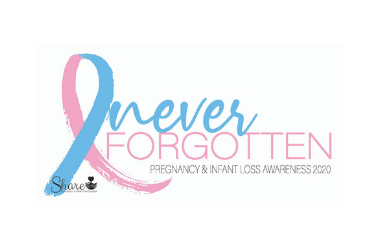Blog
During Pregnancy and Infant Loss Awareness Month, Dr. Jennifer Lefner, Chief of Newborn Medicine at Saratoga Hospital, shares her own experience with pregnancy loss.
According to the Centers for Disease Control (CDC) and the American College of Obstetrics and Gynecology, 10% to 15% of all known pregnancies end in miscarriage in the first trimester, and another 1% end in stillbirth. These statistics are intended, I suppose, to make a woman feel “better,” as if she is a member of a group or a “secret club.”
Perhaps they hope to remind us we are not alone.
My daughter was nine months old when I became pregnant again. While we eventually planned to expand our family, my husband and I both had full-time jobs, and with a young child at home, we did not feel we were quite ready.
But, there it was—a new member of our family we couldn’t help but love so much.
And then, seven weeks later…it wasn’t.
The rollercoaster of initial shock, followed by hope and joy, turned quickly to disbelief and devastation. To make matters worse, my miscarriage actually occurred when I was on call at the hospital. Alone. I had to complete patient rounds before I could leave, and it was absolutely horrific.
Some women hide their loss, perhaps due to how early in the pregnancy it happened. Others grieve loudly and openly, through social media and support groups. A woman may experience sadness, defeat, guilt, helplessness—these feelings and a thousand others are common after the loss of a pregnancy or an infant. I remember going out to lunch with my husband after my miscarriage, drinking a large glass of wine, crying at the table, and taking a nap. Then, I packed it all away. I did not seek help for so many reasons I told myself were acceptable.
I am too busy with our infant daughter. I have so much going on at work. I’m embarrassed. I’m ashamed.
My way was not right or wrong. It was simply mine. Each reaction is personal. It cannot and should not be subject to judgment from family, from friends or colleagues—from anyone.
It’s especially important for you to be kind to yourself, because pregnancy and infant loss is only the beginning of an unspoken trauma that can linger for months, or even years. It is a pain beyond description to know the life you were meant to nurture and protect is over before it began. Some women may have to deliver their child and experience bleeding and soreness for days afterward. Those same women will feel their breasts swell with milk as they explain to family and friends why the baby shower gifts have to be donated, or returned.
If you or a loved one are also an unwilling member of this “secret group,” I can only say that, no matter how different our personal experiences may be, we can grieve our losses together. And if you are a nurse or a physician, a member of a patient care team—you, too, know how it feels to hold an infant too premature, or one with a condition incompatible with life, to withdraw care in the NICU, to be the person who has to tell a family this gut-wrenching news. You’ve heard the unforgettable wail of a mother who has to leave your hospital without her baby.
Whether you are the parents or grandparents, the aunts, uncles or cousins, the friend, the provider—I ask you to please, please understand that we grieve with you. You are not alone.
There are many national and local resources to support women through pregnancy and infant loss. Hearing another story will not necessarily make you—or me—hurt any less, but it can bring us together under an umbrella of empathy and love. Hopefully, we can take small steps forward toward a bright future while always remembering, with boundless love, the little ones who live on only in our hearts.
Dr. Jennifer Lefner is chair of the Department of Pediatrics and chief of Newborn Medicine at Saratoga Hospital.

